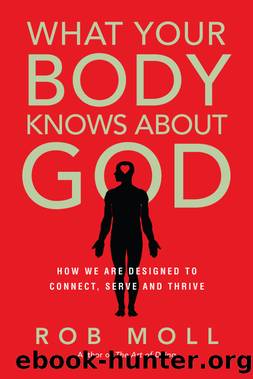What Your Body Knows about God by Moll Rob;Card Michael;

Author:Moll, Rob;Card, Michael; [Moll, Rob]
Language: eng
Format: epub
Publisher: InterVarsity Press
Published: 2014-10-21T00:00:00+00:00
Why the Spiritual Disciplines Work
We are accepted by God because of his love for us, not because of what we believe or our efforts to do the right things. But growth in love, patience, hope, goodness, faithfulness and all these traits of spiritual unity with Christ involves the disciplined actions of our bodies. As much as we intellectually assent to our faith, the actions of our bodies must be aligned to these thoughts for us to have any success in our spiritual growth. This alignment is what makes the spiritual disciplines so valuable. By pairing thought with action, the spiritual disciplines provide the routines necessary to train our bodies, and thus our minds as well, to follow after Jesus.
Neuroscience sheds light on how fasting and other spiritual disciplines work by training the subconscious mental processes that respond to the habits and desires of our bodies. Damasioâs gambling subjects intuitively understood how to win the game before they could explain why the winning strategy worked. What this means for our spiritual lives is that we must develop our spiritual intuition through the activities we undertake. Before we consistently and consciously choose the things of God, we need to habitually feel and desire them.
For example, though there are many reasons to fast, studies suggest that at a very basic level this limited dose of self-control can increase a personâs overall self-control. Fasting can train and shape the subconscious processes that regulate our desires. One study found that students who intentionally practiced good posture for a period of two weeks showed significant improvement afterward on measures of self-control.8 In other words, practicing a low level of self-control gives us the ability to control ourselves in other ways.
The ability to control our relationship to food is, of course, one of the most difficult of the disciplines, but traditional fasting isnât starvation. Instead, on certain days of the year many Christians fast by eating something like a vegan diet. This kind of modest control over our intake, the kind that we can consciously choose, enables us to then control ourselves in other more significant ways. And when we failâas we willâit teaches us a modest measure of humility.
As we consider how the brain directs the body, we must remember that there is no foreman of the brain barking out orders to subordinates. Every action we take changes our brains in a variety of ways. The connections between neurons strengthen or weaken, enabling or inhibiting our behaviors. âAs far as we can tell,â says neuroscientist David Eagleman, âall activity in the brain is driven by other activity in the brain, in a vastly complex, interconnected network.â Since there is no command center in the brain, consciousness remains a mystery for scientists. When our good intentions go awry or our actions donât necessarily reflect our beliefs, we donât need to worry or mentally beat ourselves up. We are simply complex people with various competing impulses. Eagleman continues, âWe donât find any spot in the brain that is not itself driven by other parts of the network.
Download
This site does not store any files on its server. We only index and link to content provided by other sites. Please contact the content providers to delete copyright contents if any and email us, we'll remove relevant links or contents immediately.
Signature in the Cell: DNA and the Evidence for Intelligent Design by Stephen C. Meyer(2879)
Real Sex by Lauren F. Winner(2867)
The Holy Spirit by Billy Graham(2777)
The Secret Power of Speaking God's Word by Joyce Meyer(2754)
The Gnostic Gospels by Pagels Elaine(2399)
Jesus by Paul Johnson(2229)
Devil, The by Almond Philip C(2205)
23:27 by H. L. Roberts(2144)
The Nativity by Geza Vermes(2115)
Chosen by God by R. C. Sproul(2055)
All Things New by John Eldredge(2052)
Angels of God: The Bible, the Church and the Heavenly Hosts by Mike Aquilina(1870)
Angels by Billy Graham(1844)
The Return of the Gods by Erich von Daniken(1841)
Knowing God by J.I. Packer(1724)
Jesus of Nazareth by Joseph Ratzinger(1708)
Evidence of the Afterlife by Jeffrey Long(1705)
The Gnostic Gospel of St. Thomas by Tau Malachi(1680)
How To Be Born Again by Billy Graham(1670)
